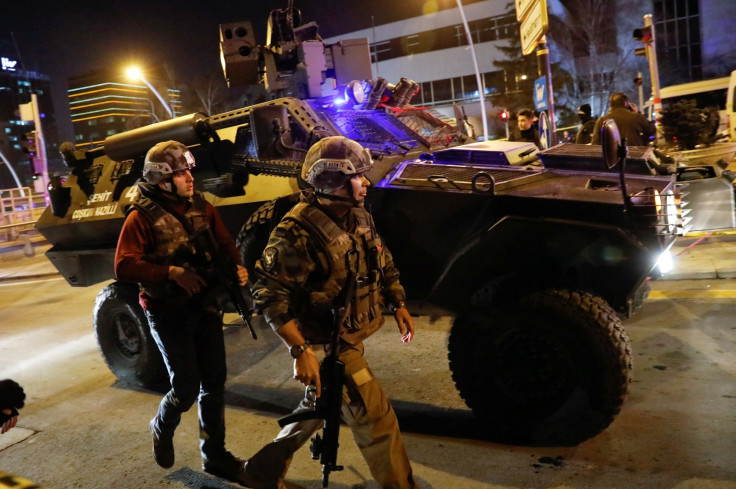Letter from Ankara: From Gulenists to Isis, the blame game is beginning in Turkey
Turkish and Russian voices are using this latest attack to drive a wedge between Turkey and the West.

It took great effort for Russia and Ankara to heal their broken ties after the downing of a Russian jet over Syria last November. And now the assassination of Russian Ambassador Andrey G. Karlov in the Turkish capital of Ankara opens a new difficult page for the two countries.
Much debate has been sparked about the broader impact of the murder of Karlov by an off duty police officer for regional dynamics and bilateral relations between the two countries. Some people even drew parallels with the assassination of Austrian Archduke Franz Ferdinand, the spark that began World War I.
The event is the first assassination of a foreign ambassador on Turkish soil since 1971, when the Israeli Consul General in Istanbul, Ephraim Elrom, was kidnapped and shot to death.
While we know the identity of the assailant, we do not know his real intention and who was behind him. The assassination can be a lone wolf operation undertaken by a radicalised police officer. Or perhaps Mert Altintas pulled the trigger in the name of a terrorist organisation to sabotage relations between Russia and Turkey and destabilise Turkey.
The Gulen Movement has been blamed in some government circles. The latest information reveals that Altintas graduated from a Gulenist prep school, while his uncle was a high-profile manager in a Gulenist private school in Turkey, one of the dozens of schools that was closed after the failed coup attempt on July 15.
But there are also those that argue there might be a third party intelligence service behind the assassination, aiming to sabotage Russia-Turkey relations.
It is too early to speculate on which of these scenarios are most likely, but it is clear that the assassination took place within the context of the Syrian civil war and bloody takeover of Aleppo by the regime forces supported by Russia. "Don't forget Aleppo. Don't forget Syria," the gunman shouted after he opened fire on Karlov.
If Mert Altuntaş was a lone wolf, he was radicalised by developments in Syria. If he was used by a terrorist organisation or an intelligence agency, the Syrian civil war was the link between the assassination and the targeted political outcome.
Messages coming from Moscow suggest that Russia does not choose to turn the assassination of its ambassador in Ankara into a major diplomatic crisis, yet. Both countries considered the attack as a provocation and showed the signs that "they will keep calm and continue their partnership". However, Russia's eventual reaction will also depend on Turkey's position regarding the future of Syria.
Russia and Turkey were on a collision course since the beginning of the Syrian uprising with Russia supporting the Assad government and Turkey the rebels, climaxing in the downing of a Russian fighter jet on Turkish airspace bordering Syria. More recently the two sides have been able to reach an agreement which allowed Turkey to support the Free Syria Army against Islamic State and the PYD along Turkey's borders with Syria and the Assad regime to control Aleppo with Russian support.
While the endgame in Syria is approaching, Russia had already created facts on the ground that favoured its strategy. The assassination of the Russian ambassador in Ankara took place the day before foreign ministers of Russia, Turkey and Iran gathered in Moscow to discuss the future of Syria.
Russian officials also did not miss the opportunity to put a new wedge between Turkey and Western allies.
While there is no outcome of the meeting yet, it would be fair to argue that Turkey had weakened its hand at the negotiation table after the failure to protect Karlov in Turkey in line with the Vienna Convention on Diplomatic Relations (1961). Therefore, the balance on the future of Syria has clearly shifted towards the Russian position after the attack.
Unsurprisingly, the image of the West in general and the United States in particular are also victims of the assassination, and pro-government circles in Turkey lost no time in blaming them. Russian officials also did not miss the opportunity to put a new wedge between Turkey and Western allies.
It is also worth mentioning that the attack showed once again the vulnerability of Turkey against terror attacks – unable to protect the foreign diplomatic corps in the heart of its capital city. Only two weeks before, twin terror attacks occurred in Istanbul killing 45 people, mostly policemen, and injuring over 155, while last week 13 off-duty soldiers in a bus were killed by car bomb in the central province of Kayseri, allegedly by the outlawed Kurdistan Workers Party (PKK).
Such an unstable atmosphere will inevitably have repercussions over the country's tourism and investment climate in the upcoming days.
© Copyright IBTimes 2025. All rights reserved.






















